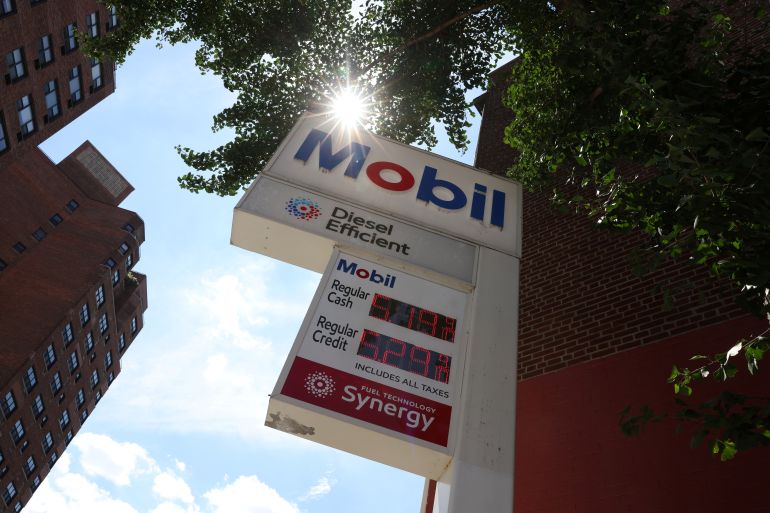Will global oil prices keep rising due to the Israel-Hamas war?
Analysts see limited effect on prices in short term as neither Israel nor Gaza are significant producers.

Global oil prices have spiked since fighting erupted between Israel and Hamas amid speculation about how the conflict could affect energy production in the Middle East.
On Monday, global benchmark Brent Crude rose 4.2 percent to $88.15 a barrel, while US benchmark West Texas Intermediate rose 4.3 percent to $86.38 per barrel.
Keep reading
list of 4 itemsThe Take: Where do you go when Israel strikes down your home in Gaza?
Dozens killed and injured in military attack on Myanmar refugee camp
Hamas says will kill hostages if Israeli attacks on Gaza civilians continue
Prices on Tuesday eased slightly, with Brent Crude and West Texas Intermediate falling 36 cents and 35 cents, respectively.
While neither Israel nor the besieged Gaza Strip are significant oil producers, markets have been jolted by fears that the conflict could lead to wider regional instability.
The Middle East is home to some of the world’s biggest major oil producers, including Iran and Saudi Arabia, as well as key transit routes such as the Strait of Hormuz, which is known as the world’s most important “oil chokepoint”.
Will oil prices keep rising for the foreseeable future?
While much will depend on how the conflict plays out, analysts say the immediate effect on energy prices is likely to be limited.
Unlike the spike in oil prices that followed Russia’s invasion of Ukraine last year, the fighting between Israeli soldiers and Hamas fighters, which has killed more than 1,500 people so far in Israel and Gaza, does not directly involve oil-producing nations.
Morgan Stanley said in a note on Monday that the near-term risk to oil supply was low but that could change if the conflict spread to other countries.
“In the very short term, despite the speculative reaction we are seeing in the oil market, I see the upside risk to crude prices as actually being limited from this event,” Mike Rothman, president and founder of Cornerstone Analytics, told Al Jazeera.
Rothman said that he also does not expect the conflict to impact global demand and OPEC production in the longer term, although other factors such as declining oil inventories elsewhere in the world could affect prices.
What factors could lead oil prices to rise further?
Two key factors to watch are whether the conflict draws in Iran or Hezbollah, a Lebanon-based armed group that is an ally of both Hamas and Iran.
On Monday, Hezbollah said it had fired a barrage of rockets after at least three of its members were killed during an Israeli bombardment amid rising border tensions.
Iran denied involvement in Hamas’s surprise attack on Israel on Saturday, following a report in the Wall Street Journal that claimed Iranian security officials helped plan the assault.
The US and Israel military both say they have seen no evidence to support Iranian involvement, although Tehran offered its congratulations to Hamas following the attack.
How could Iran’s involvement affect oil prices?
Former US President Donald Trump reimposed sanctions on Iran’s oil industry in 2018, but Iranian oil exports and output rose in 2022 and 2023 as Washington and Tehran resumed talks over the Islamic republic’s controversial nuclear programme.
Any evidence of Iranian involvement in the Hamas attack would likely deal a setback to those negotiations and potentially lead to further US sanctions on Iranian energy.
“The recent jump in oil price reflects the oil market being concerned about the conflict becoming a wider conflagration, which could involve Middle East regional players becoming involved through their proxy agents,” Alan Gelder, an analyst at Wood Mackenzie, told Al Jazeera.
“The most immediate market impact could become more stringent enforcement on Iranian exports – which have grown by over 400 kb/d over the course of this year – by the US if the conflict widens. We are closely watching regional and international diplomatic efforts to avoid further escalation.”
In an interview with CNBC on Monday, Rapidan Energy Group President Bob McNally said that oil prices could surge by $5 to $10 a barrel if Iran was drawn into the conflict.
Rothman, however, said he had “serious doubts” that Israel would directly engage with Iran militarily.
“While Tehran has indicated its support for the Hamas attack, that verbal support falls well short of the evidence needed for Israel to respond kinetically to Iran,” he said.
What happened to oil prices during previous conflicts involving Israel and Palestinians?
The current rise in oil prices has conjured up memories of the 1973 oil crisis that followed the October War, when Egypt and Syria launched a surprise attack on Israel to regain territory.
Like Saturday’s attack by Hamas, the war 50 years ago began on a Jewish holiday and caught Israeli forces unawares.
In response to US support for Israel during the 1973 conflict, Arab oil-producing countries cut oil production and placed embargoes on the US and some of its allies, causing oil prices to quadruple over the following months.
The situation today, however, is very different from back then.
Rothman said there was a “near-zero probability” of such a dramatic spike in prices happening this time.
“The fallout of the ’73 embargo made many in OPEC conclude that the action was a huge mistake because of the decades of ill-will generated by the large oil-consuming nations,” he said.